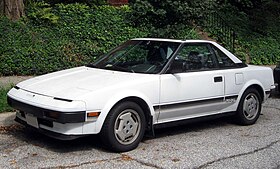Toyota MR2
| Toyota MR2 | |
|---|---|
 |
|
| Overview | |
| Manufacturer | Central Motors (part of the Toyota Motor Corporation) |
| Production | 1984–2007 |
| Assembly | Sagamihara, Japan |
| Body and chassis | |
| Class | Sports car |
| Layout | Transverse mid-engine, rear-wheel drive |
| W10 | |
|---|---|
 |
|
| Overview | |
| Production | June 1984–1989 |
| Body and chassis | |
| Body style | 2-door coupé |
| Layout | Transverse mid-engine, rear-wheel drive |
| Powertrain | |
| Engine | 1.5 L 3A-LU I4 (AW10) 1.6 L 4A-GE DOHC I4 (AW11) 1.6 L 4A-GZE supercharged I4 (AW11) |
| Transmission | 5-speed manual 4-speed automatic |
| Dimensions | |
| Wheelbase | 2,319 mm (91.3 in) |
| Length | 3,950 mm (155.5 in) |
| Width | 1,666 mm (65.6 in) |
| Height | 1,234 mm (48.6 in) |
| Curb weight | 1,035 kg (2,282 lb) (1985 NA) 1,066 kg (2,350 lb) (1988 NA) 1,131 kg (2,493 lb) (1988 SC) |
| W20 | |
|---|---|
 |
|
| Overview | |
| Production | 1989–August 1999 |
| Designer | Kazutoshi Arima Tadashi Nakagawa (roadster) |
| Body and chassis | |
| Body style | 2-door coupé or T-top |
| Layout | Transverse mid-engine, rear-wheel drive |
| Powertrain | |
| Engine | 2.2 L 5S-FE I4 (SW21) 2.0 L 3S-GE I4 (SW20) 2.0 L 3S-GTE turbo I4 (SW20) |
| Transmission | 4-speed automatic 5-speed manual |
| Dimensions | |
| Wheelbase | 2,400 mm (94.5 in) |
| Length | 4,171 mm (164.2 in) |
| Width | 1,699 mm (66.9 in) |
| Height | 1,234 mm (48.6 in) |
| Curb weight | 2,782lbs (1,262 kg) (1991T T-top); 2,599lbs (1,179 kg) (1991NA) |
| W30 | |
|---|---|
 |
|
| Overview | |
| Also called | Toyota MR-S (Japan) MR2 Spyder (North America) MR2 Roadster (Europe) |
| Production | October 1999 – July 2007 |
| Body and chassis | |
| Body style | 2-door convertible |
| Layout | Transverse mid-engine, rear-wheel drive |
| Powertrain | |
| Engine | 1.8 L 1ZZ-FED I4 (ZZW30) |
| Transmission | 5-speed manual 6-speed manual (Europe) 6-speed Sequential Manual |
| Dimensions | |
| Wheelbase | 2,451 mm (96.5 in) |
| Length | 3,886 mm (153 in) |
| Width | 1,694 mm (66.7 in) |
| Height | 1,240 mm (48.8 in) |
| Curb weight | 996 kg (2,195 lb) |
The Toyota MR2 is a two-seat, mid-engined, rear-wheel-drive sports car manufactured in Japan and marketed globally by Toyota from 1984 to 2007 over three generations: W10 (1984–1989), W20 (1990–1999) and W30 (2000–2007).
Conceived as a small, economical and sporty car, the MR2 employed straightforward design elements, including MacPherson strut front and rear suspensions and transverse-mounted inline-four engines.
The name MR2 stands for either "mid-ship, run-about, 2-seater" or "mid-engine, rear-wheel-drive, 2-seater.
The MR2 derived from a 1976 Toyota design project with the goal of a car which would be enjoyable to drive, yet still provide good fuel economy — not necessarily a sports car. Design work began in 1979 when Akio Yoshida from Toyota's testing department started to evaluate alternatives for engine placement and drive method, finalizing a mid-transverse engine placement. Toyota called the 1981 prototype SA-X.
From its original design, the car evolved into a sports car, and further prototypes were tested both in Japan and in California. Significant testing was performed on race circuits including Willow Springs, where former Formula One driver Dan Gurney tested the car.
All three generations were in compliance with Japanese Government regulations concerning exterior dimensions and engine displacement. The MR2 appeared around the same time as the Honda CR-X, the Nissan EXA, the VW Scirocco and Fiat X1/9 from Europe, and the Pontiac Fiero and Ford EXP from North America.
Toyota debuted its SV-3 concept car in October 1983 at the Tokyo Motor Show, gathering press and the audience publicity. The car, scheduled for a Japanese launch in the second quarter of 1984 under the name MR2, was to become the first mass-produced mid-engined car from a Japanese manufacturer.
...
Wikipedia
